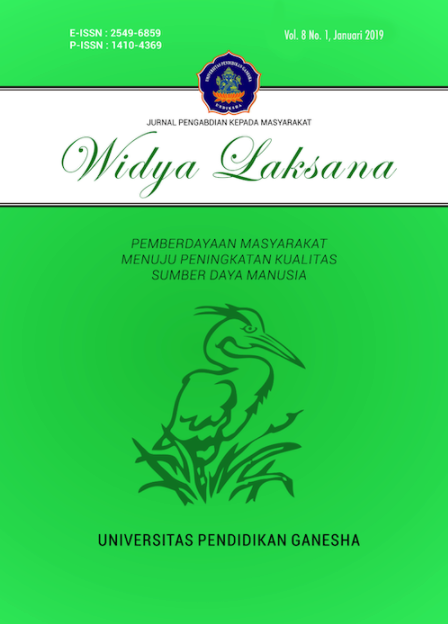PEMBEKALAN DAN IMPLEMENTASI PEMBELAJARAN ABAD 21 BAGI GURU BAHASA INGGRIS SMP KABUPATEN SUMEDANG
DOI:
https://doi.org/10.23887/jwl.v10i2.32352Abstrak
Penguatan Keterampilan Abad 21 mencakup Kualitas Karakter Siswa (Religiositas, Nasionalisme, Kemandirian, Gotong royong, dan Integritas), Keterampilan Literasi Dasar (Bahasa, Numerasi, Sains, Digital, Finansial, serta Budaya dan Kewargaan), serta Kompetensi (Berpikir kritis, Kreativitas, Komunikasi dan Kolaborasi) merupakan kemampuan yang harus dimiliki pendidik. Target dari pengabdian ini adalah para guru mata pelajaran Bahasa Inggris yang tergabung dalam Musyawarah Guru Mata Pelajaran (MGMP) jenjang SMP di Kabupaten Sumedang. Materi yang disampaikan mencakup penyusunan rencana pembelajaran Berbasis Keterampilan, Pelaksanaan Pembelajaran, serta Evaluasi Pembelajaran termasuk penilaian Abad 21 dan tindak lanjutnya. Berdasarkan respon guru sasaran, pelatihan dan workshop ini dianggap mampu meningkatkan empat kompetensi abad 21 yang diperlukan.Referensi
Au, W. (2011). Teaching under the new Taylorism: high‐stakes testing and the standardization of the 21stcentury curriculum. Journal of Curriculum Studies, 43(1), 25-45. doi:10.1080/00220272.2010.521261
BSNP. (2010). Laporan BSNP Tahun 2010. Jakarta: Badan Standar Nasional Pendidikan. Dornyei, Z. (2007). Research Methods in Applied Linguistics. Oxford: Oxford University Press.
Fisher, C., Dwyer, D. C., & Yocam, K. (1996). Education & Technology: Reflections of Computing in Classrooms. San Franscisco, CA: Jossey-Bass.
Garba, S. A., Yusuf, B., & Busthami, A. H. (2015). Toward the Use of Technology and 21st Century Teaching-learning Approaches: The Trend of Development in Malaysian Schools within the Context of Asia Pacific. International Journal of Emerging Technologies in Learning (iJET), 10(4). doi:10.3991/ijet.v10i4.4717
Hatsch, & Farhady. (1982). Research Design and Statistic for Applied Linguistics. Massachusetts: Newbury House Publisher, Inc.
Hatsch, & Lazaraton. (1994). The Research Manual; Design and Statistic for Applied Linguistics. Massachusetts: Heinle & Heinle Publishers.
Kemdikbud. (2013). Penyelenggaraan Pendidikan Sistem Ganda pada Sekolah Menengah Kejuruan. Jakarta: Direktorat Pendidikan Menengah Kejuruan.
Kivinen, O., Piiroinen, T., & Saikkonen, L. (2016). Two viewpoints on the challenges of ICT in education: knowledge-building theory vs. a pragmatist conception of learning in social action. Oxford Review of Education, 42(4), 377-390. doi:10.1080/03054985.2016.1194263
Rahman, A. A., & Angraeni, A. (2020). Empowering Learners with Role-Playing Game for Vocabulary Mastery. International Journal of Learning, Teaching and Educational Research, 19(1), 60-73. doi:10.26803/ijlter.19.1.4
Sandholtz, J. H., Ringstaff, C., & Dwyer, D. C. (1997). Teaching with Technology: Creating Student-Centered Classrooms. New York: Teacher's College Press.
Selwyn, N., & Facer, K. (2014). The sociology of education and digital technology: Past, present and future. Oxford Review of Education, 40, 482-496.
Simin, G., Ahmad, Z. A., Muhammad, F. A., Ng, R. Y., Yao, M., & Zhang, T. (2014). Integration in education: incorporation of teaching and learning improvement. The Malaysian Online Journal of Educational Technology, 2, 24-54.
Trilling, B., & Fadel, C. (2009). 21st Century Skills: Learning for Life in Our Times: John Wiley & Sons.
Trilling, B., & Hood, P. (1999). Learning, Technology, and Education Reform in the Knowledge Age. WestEd Educational Technology, 1-26.
Unduhan
Diterbitkan
Terbitan
Bagian
Lisensi
Authors who publish with the Widya Laksana agree to the following terms:- Authors retain copyright and grant the journal the right of first publication with the work simultaneously licensed under a Creative Commons Attribution License (CC BY-SA 4.0) that allows others to share the work with an acknowledgment of the work's authorship and initial publication in this journal
- Authors are able to enter into separate, additional contractual arrangements for the non-exclusive distribution of the journal's published version of the work (e.g., post it to an institutional repository or publish it in a book), with an acknowledgment of its initial publication in this journal.
- Authors are permitted and encouraged to post their work online (e.g., in institutional repositories or on their website) prior to and during the submission process, as it can lead to productive exchanges, as well as earlier and greater citation of published work. (See The Effect of Open Access)



